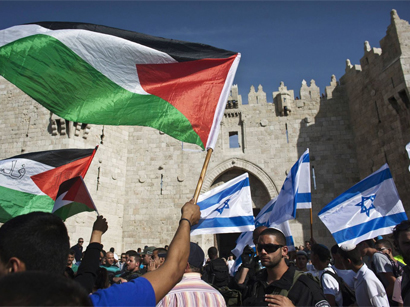Israel said its military would hold fire in most of the Gaza Strip for seven hours on Monday to facilitate the entry of humanitarian aid and for displaced Palestinians to return to their homes, but would fight back if attacked, CBC news reported.
The humanitarian truce, beginning at 10 a.m. EEST (3 a.m. ET), would not apply in areas of the southern Gaza town of Rafah where Israeli forces are still operating, a Defence Ministry official said in a statement.
Israel withdrew most of its ground troops from the Gaza Strip on Sunday in an apparent winding down of the nearly month-long operation against Hamas that has left more than 1,800 Palestinians and more than 60 Israelis dead.
Even as Israel said it was close to completing its mission, heavy fighting raged in parts of Gaza, with at least 10 people killed in what UN and Palestinian officials said was an Israeli airstrike near a UN shelter. The United States lashed out at Israel, saying it was "appalled" by the "disgraceful" attack.
And with Hamas officials vowing to continue their fight, it remained uncertain whether Israel could unilaterally end the war.
Israel launched its military operation in Gaza on July 8 in response to weeks of heavy rocket fire, carrying out hundreds of airstrikes across the crowded seaside territory. It then sent in ground forces July 17 in what it said was a mission to destroy the tunnels used by Hamas to carry out attacks.
Hamas has fired more than 3,000 rockets into Israel during what has turned into the bloodiest round of fighting ever between the two enemies.
Lt.-Col. Peter Lerner, an Israeli military spokesman, confirmed the bulk of ground troops had been pulled out of Gaza after the military concluded it had destroyed most of the tunnel network.
He said Israel had detected some 30 tunnels that were dug along the border for what he called a "synchronized attack" on Israel.
"We've caused substantial damage to this network to an extent where we've basically taken this huge threat and made it minimal," he said. The army had thousands of troops in Gaza at the height of the operation.
In southern Israel, armoured vehicles could be seen rolling slowly onto the back of large flatbed trucks near the Gaza border, while soldiers folded flags from atop a tank and rolled up their belongings and sleeping bags.
Lerner said, however, that the operation was not over and that Israel would continue to target Hamas' rocket-firing capabilities and its ability to infiltrate Israel.
While Israeli Prime Minister Benjamin Netanyahu has vowed to press on against Hamas, he is coming under international pressure to halt the fighting because of the heavy civilian death toll.
UN officials say more than three-quarters of the dead have been civilians, including the 10 people killed Sunday at a UN school that has been converted into a shelter in the southern town of Rafah.
Chris Gunness, spokesperson for the United Nations Relief Works Agency in Rafah, the UN agency that assists Palestinian refugees, told CBC News on Sunday that 3,000 "displaced people" were registered in the area at the time.
"The sense of insecurity is profound and visceral because they know as they wait in their UN shelters, in these UN classrooms, that they may take direct hits because that's what has happened in previous occasions," he said, adding the incident has further "traumatized" the population of Gaza, more than half of whom are children.
"There's nowhere safe in Gaza. And that's the tragedy," he said.






